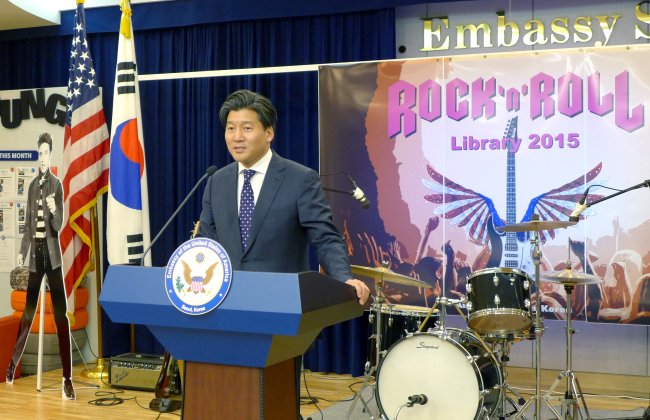A former Korean journalist has published a book that traces the holy grails of rock ‘n’ roll based on his journey across the musical heartlands of the U.S.
“In Search of Rock ‘n’ Roll Heritage: American Rock Music Landmarks” is a travelogue highlighting the cultural and economic power of museums, monuments and memorials. The book was written by Cho Hyun-jin, a distinguished professor at Kookmin University and former journalist for YTN, Arirang TV and Billboard magazine, who is also credited with coining the term “K-pop” in 1999.
Nuanced with insight, the book, written in Korean, serves as a guiding light for developing K-pop as a new growth engine.
 |
| From left: Korean folk rock singer and songwriter Han Dae-soo, U.S. Ambassador Mark Lippert, Kookmin University distinguished professor Cho Hyun-jin and Saenuri Party Rep. Chung Byung-kook appear at a press conference marking the publication of “In Search of Rock ’n’ Roll Heritage: American Rock Music Landmarks” at the American Center Korea in Seoul on Dec. 21. Joel Lee/The Korea Herald |
“This book details the past, present and future of American rock ‘n’ roll, with the past being the birthplace and home ground of artists, the present focusing on how these sites were made into tourist hot spots and the future offering ways to cultivate K-pop as durable heritage,” Cho said at a press conference at the American Center Korea in Seoul on Dec. 21.
“The soft power of Korean pop-music, movies, TV dramas and food has significantly enhanced our national image abroad and attracted foreign tourists. Public research shows that K-pop has the greatest impact in luring tourists, ahead of TV dramas, entertainment shows and movies.”
In 2013, Cho crisscrossed from New York to Los Angeles and Chicago to New Orleans, visiting over 200 locations to write a series of articles for the JoongAng Sunday newspaper.
Some of the most iconic narratives covered in the book include the first audition of the “King of Rock ‘n’ Roll” Elvis Presley (1935-77), unconfirmed grave sites of blues singer Robert Johnson (1911-38) and the influence of disc jockey Allen Freed (1921-65), as well as the lives of guitarist Jimmy Hendrix (1942-70), singer-songwriter Bob Dylan (born 1941) and ex-Nirvana front man Kurt Cobain (1967-94).
During his tour of America, the author said he received inklings about how to nurture K-pop as sustainable cultural heritage. Much as the sites he carefully investigated, Cho has suggested building a K-pop museum and hall of fame, with savvy attention to storytelling and curation, data collection, contents publication, tourism management and language services.
 |
| Cho Hyun-jin, a distinguished professor at Kookmin University and former journalist for YTN, Arirang TV and Billboard magazine, who is also credited with coining the term “K-pop” in 1999. Joel Lee / The Korea Herald |
U.S. Ambassador Mark Lippert said the book would help readers reach a deep understanding of American culture and encourage them to visit the sites.
“During our college years, our embassy Deputy Chief of Mission Mark Knapper and I both visited Graceland, a former mansion of Elvis Presley in Memphis, Tennessee. We learned that Elvis ate meat loaf for 90 days in a row. There is something special about Graceland that inspires people to go there,” Lippert said.
“There is also a rock ‘n’ roll hall of fame and museum in Cleveland in my home state Ohio. This book captures these scenes and many more.”
Korean folk rock singer and songwriter Han Dae-soo said: “This book made me feel the smell of pork ribs at a Memphis restaurant and the aroma of New Orleans’ bourbon whiskey. Rock ‘n’ roll speaks of freedom and love. In a world of violence and war, I hope the book helps people sow the seeds of love and peace.”
By Joel Lee (joel@heraldcorp.com)
 |
| Korean folk rock singer and songwriter Han Dae-soo. Joel Lee / The Korea Herald |

